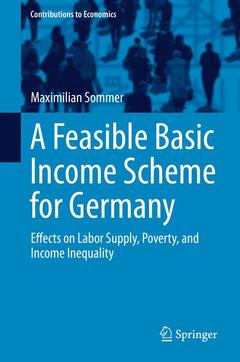Description
A Feasible Basic Income Scheme for Germany, 1st ed. 2016
Effects on Labor Supply, Poverty, and Income Inequality
Contributions to Economics Series
Language: English
Subjects for A Feasible Basic Income Scheme for Germany:
Keywords
Basic Income; Labor Supply; Microsimulation; Negative Income Tax; Poverty
Publication date: 03-2016
Support: Print on demand
Publication date: 04-2018
Support: Print on demand
Description
/li>Contents
/li>Comment
/li>
This book analyzes the consequences that would arise if Germany?s means-tested unemployment benefits were replaced with an unconditional basic income. The basic income scheme introduced is based on a negative income tax and calibrated to be both financially feasible and compatible with current constitutional legislation. Using data from the German Socio-Economic Panel (GSOEP) the author examines the impact of the reform on the household labor supply as well as on both poverty and inequality measures. It is shown that by applying reasonable values for both the basic income and the implied marginal tax rate imposed on earned incomes, efficiency gains can be reconciled with generally accepted value statements. Furthermore, as the proposal includes a universal basic income for families, child poverty could be reduced considerably. The estimates are based on the discrete choice approach to labor supply.
Proposes a concept for a feasible basic income scheme that completely reconciles socio-political and economic requirements
Applies the latest microeconomics methods, concretely analyzing allocation and distribution effects on different household types
Based on up-to-date empirical data
Includes supplementary material: sn.pub/extras




